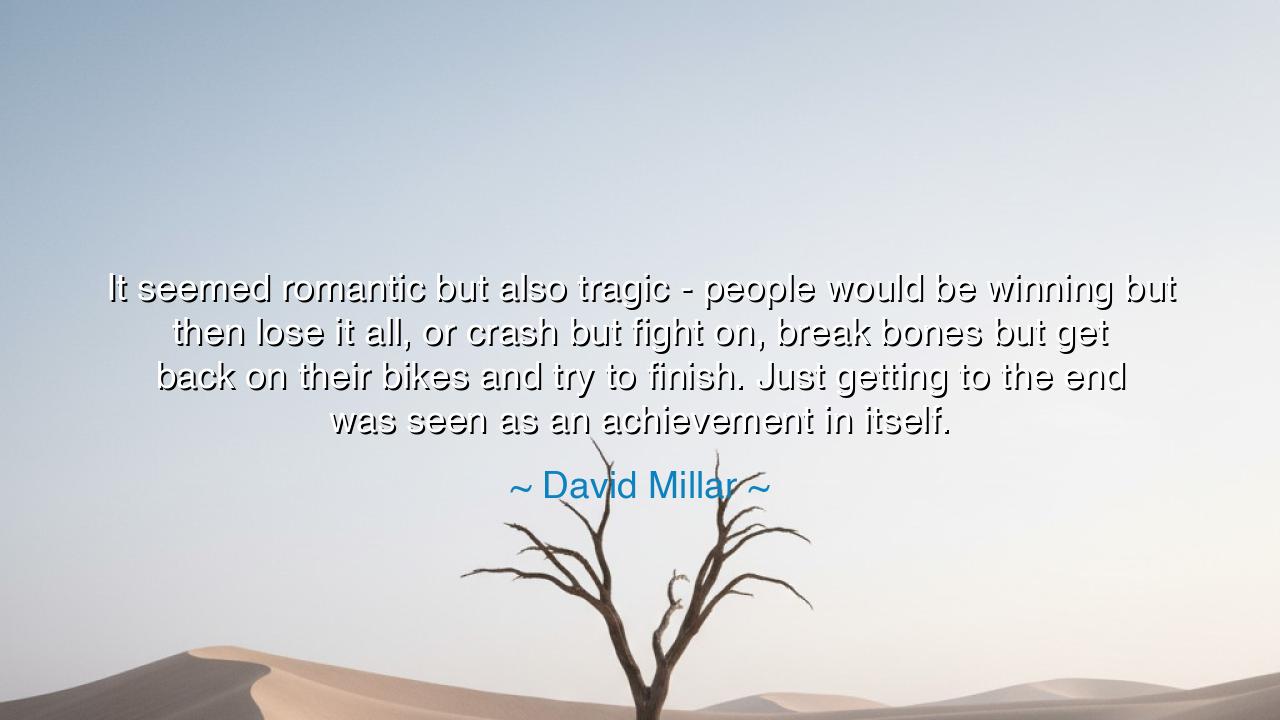
It seemed romantic but also tragic - people would be winning but
It seemed romantic but also tragic - people would be winning but then lose it all, or crash but fight on, break bones but get back on their bikes and try to finish. Just getting to the end was seen as an achievement in itself.






“It seemed romantic but also tragic—people would be winning but then lose it all, or crash but fight on, break bones but get back on their bikes and try to finish. Just getting to the end was seen as an achievement in itself.” Thus spoke David Millar, and in his words we glimpse the essence of struggle, the mingling of glory and despair, of triumph and ruin. For the tale of human endurance has ever been such: to strive with all one’s might, to be broken in body and spirit, yet to rise again, not for victory alone, but for the sacred honor of finishing the course.
The ancients would have understood this well. In the contests of Olympia, men gave their strength to the gods and to their people, knowing that the path was lined with both honor and destruction. The romantic beauty of the games was not in the crowns of olive, but in the spectacle of mortals reaching beyond mortal limits. Yet hand in hand with this beauty walked the tragic shadow of loss—athletes crushed in defeat, their bodies broken, their names fading into silence. Still, they came, and still they strove, because even to stand at the starting line was to enter into the covenant of greatness.
Consider the story of Pheidippides, the messenger of Marathon. He did not win a prize of gold, nor did he live to bask in his triumph. Yet he ran the long road to Athens, carrying news of victory, and with his last breath delivered hope to his people. His tale is both tragic and romantic, for in death he gave birth to legend. What mattered was not the prize he gained, but that he endured until the very end. Thus Millar’s words echo this same truth: sometimes the nobility lies not in the crown, but in the simple fact of finishing.
The world of cycling, like the battlefield of the ancients, is a crucible where human frailty and human will collide. Riders crash, their flesh torn, their bones fractured. Yet again and again, they lift themselves upon their machines, pressing forward through agony. To outsiders it may seem madness, yet to those who understand, it is a hymn of resilience. The romantic ideal is that of the noble warrior pressing on; the tragic reality is that the battle often consumes them. But in this tension lies the very heart of human endeavor.
And so, let us learn that true achievement is not only found in victory. It is found in persistence, in refusing surrender when surrender would be easiest. The world is filled with those who shine briefly and then fall away, but the ones remembered with reverence are those who, even broken, still walk—or crawl—to the finish line. To finish, even scarred and wounded, is to proclaim: “I endured, I did not yield.”
History teaches this in many ways. Think of Ernest Shackleton and his men, stranded on the ice of Antarctica. They did not conquer their original goal; they did not plant their flag where they intended. Yet their struggle to survive, their refusal to give in to despair, became a tale greater than any victory. Their achievement was not conquest, but endurance—just as Millar reminds us that sometimes “just getting to the end” is the noblest triumph of all.
Therefore, children of tomorrow, do not measure yourselves only by crowns and prizes. Measure yourselves by the courage with which you rise after each fall, by the fire that drives you to continue when all seems lost. Life is both romantic and tragic, filled with soaring hopes and crushing defeats. But if you endure, if you finish your course, however battered, you have written your name in the scroll of the brave.
So let your practical action be this: when life casts you down, rise again. When dreams shatter, gather their fragments and continue your journey. Do not despise small victories, for even crossing the line, bruised and weary, is glory in itself. For in the end, the world remembers not only the winners, but also those who refused to yield—those who, broken but unbowed, finished the race.






AAdministratorAdministrator
Welcome, honored guests. Please leave a comment, we will respond soon